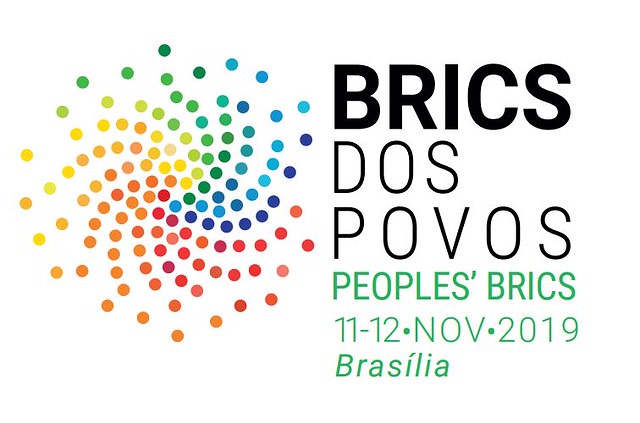“Peoples’ BRICS” to Be Held Concurrently with BRICS Summit in November
BRICS, 4 Nov 2019
Brasil de Fato – TRANSCEND Media Service

Researchers and activists from five countries will debate about imperialism, economic and political crisis, solidarity, and integration. / Handout
People’s movements, unions, and parties will debate common issues between Brazil, Russia, India, China, and South Africa.
29 Oct 2019 – People’s movements, labor unions, and political parties from the five countries that are members of the BRICS – Brazil, Russia, India, China, and South Africa – will gather in Brasília, capital of Brazil, on Nov. 11 and 12 for the Peoples’ BRICS.
The event was planned to happen concurrently with the BRICS Summit, in which government representatives will meet two days later, also in the capital of Brazil.
Researchers and political activists from the five countries will debate about topics such as imperialism, economic and political crisis, international solidarity, and the integration between the peoples.
Approximately 300 people are expected to attend the event. Confirmed participants include representatives of the National Union of Metalworkers of South Africa (NUMSA); the Safai Karmachari Andolan, an Indian movement of Dalits (a group that is considered to be untouchable and often subjected to brutal violence in Indian society’s caste system); and the Russian Academy of Sciences.
João Pedro Stedile, from the national board of Brazil’s Landless Workers’ Movement (MST), a co-organizer of the Peoples’ BRICS, supports that the official summit between governments, which will be held on Nov. 13 and 14, is superficial.
“The BRICS Summit will gather governments and presidents. We fear that their agendas will be nothing more than trade agreements and financial talks for projects to be funded by the BRICS bank,” Stedile says.
“The BRICS were proposed as a regional association aiming exactly to expose the imperialism of the United States, of the economic domination, of the dollar, and of the manipulation of other international organizations, such as the IMF [International Monetary Fund], the World Bank, and the WTO [World Trade Organization],”
the Brazilian landless leader adds, pointing out the goals established when the BRICS were first established.
The organizers of the “Peoples’ BRICS” are also concerned about how ultraconservative forces have been advancing in countries such as Brazil and India, which poses new common challenges, including to stop foreign interests from impacting election processes through the media and social media.
“Brazil and India have right-wing governments characterized as neo-fascist governments. Brazil’s government is completely subservient to the interests of the United States government. Meanwhile, India has contradictions with the US government, even though it is right-wing on a domestic level,” Stedile argues. “The South African government is neo-developmentalist, but under conditions in which the economic and social apartheid remains. Next to Brazil, these are the most socially unequal countries, with the widest wealth gap.”
Nalu Faria, from Brazil’s national board of the World March of Women, points out that one of the biggest challenges is to pursue international unity as the working class in the five countries have been struggling with setbacks. “The geopolitical dispute has changed in the world. And we, as the people, have to be closely associated with each other in order to put our demands and our sovereignty first,” she says.
“It’s our strength as the organized people that will, in this geopolitical dispute, guarantee or build this sense of change that is able to dismantle all this system of oppression, exploitation, discrimination. We want to forge the struggle from an anti-capitalist perspective, understanding that capitalism is a patriarchal, racist, LGBT-phobic, nature-depredating model,” Faria adds.
Check out the Peoples’ BRICS Summit schedule:
Nov. 11, 2019 – Monday
- Discussion 1: Imperialism, International Geopolitics, Role of BRICS and the People
- Discussion 2: Economic, Social and Environmental Crisis and Development Alternatives from the People
Nov. 12, 2019 – Tuesday
- Discussion 3: International Political Crises and People’s Struggles
- Discussion 4: Challenges of Internationalism, Solidarity and the Integration of Peoples
____________________________________________________
Leia em português | Leer en español
Edition: Camila Maciel
Go to Original – brasildefato.com.br
Tags: Activism, BRICS, Capitalism, Democracy, Development, Economics, Environment, Geopolitics, Human Rights, Indigenous Rights, International Relations, Justice, Latin America Caribbean, Media, NATO, Nonviolence, Peace, Politics, Power, Social justice, Solutions, Violence, War, West, Whistleblowing, World
DISCLAIMER: The statements, views and opinions expressed in pieces republished here are solely those of the authors and do not necessarily represent those of TMS. In accordance with title 17 U.S.C. section 107, this material is distributed without profit to those who have expressed a prior interest in receiving the included information for research and educational purposes. TMS has no affiliation whatsoever with the originator of this article nor is TMS endorsed or sponsored by the originator. “GO TO ORIGINAL” links are provided as a convenience to our readers and allow for verification of authenticity. However, as originating pages are often updated by their originating host sites, the versions posted may not match the versions our readers view when clicking the “GO TO ORIGINAL” links. This site contains copyrighted material the use of which has not always been specifically authorized by the copyright owner. We are making such material available in our efforts to advance understanding of environmental, political, human rights, economic, democracy, scientific, and social justice issues, etc. We believe this constitutes a ‘fair use’ of any such copyrighted material as provided for in section 107 of the US Copyright Law. In accordance with Title 17 U.S.C. Section 107, the material on this site is distributed without profit to those who have expressed a prior interest in receiving the included information for research and educational purposes. For more information go to: http://www.law.cornell.edu/uscode/17/107.shtml. If you wish to use copyrighted material from this site for purposes of your own that go beyond ‘fair use’, you must obtain permission from the copyright owner.